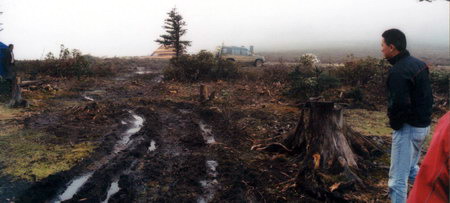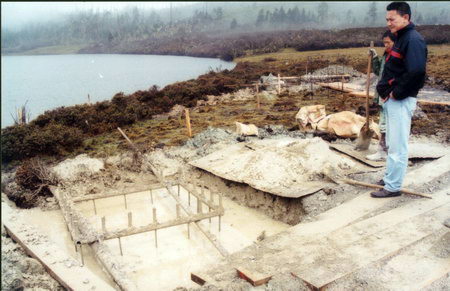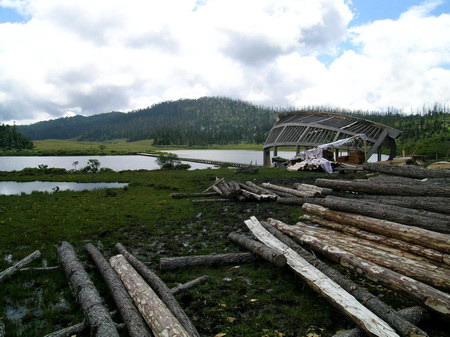
The Promise In Shangri La
(Nanfengchuang) By Yin Hongwei (尹鸿伟 ). August 24, 2005.
In May 2005, a 11-minute clip from the movie The Promise was premiered in France. Upon information, the investment in this movie amounted to almost 300 million yuan and production will finish in August 2005. The Promise, which is expected to debut before the Spring festival of 2006, is one of the most expensive movies in China in recent years.
The commercial hype, the media applause and the expectations of the audience seem to make all this quite distant from the people in Shangri La county in Diqing, Yunnan province. People cannot forgive the fact that before Chen Kaige brought the film crew of The Promise to the county, this was a paradise rarely known to the outside world. But now, one year after the production team has departed, the beautiful lake has been totally defaced.
Beautiful Yunnan. Beautiful Shangri La. This is the place that so many people fantasize about. In recent years, the Yunnan government has tried to turn itself to a "grand province for ethnic culture," "tourist province" and "movie production base," and it has some visible accomplishments already. During the process, for any work or activity that can promote the image of Yunnan, the provincial government cooperated diligently.
It was at such a moment like this that director Chen Kaige came to Yunnan with this movie project -- the love historical epic blockbuster The Promise. According to the original plan, besides the Hengdian Movie City in Zhejiang, The Promise also chose two outdoor scenes in Yunnan province: Tulin of Yuanmo and the Bigu lake of Shangri La. Of these, Hengdian and Tulin are commercial sites which have accommodated similar events, but Bigu lake was an undeveloped natural site which very few tourists have visited. It would be the first movie shoot there.
The selection of the sites for The Promise was warmly welcomed and supported by Yunnan province. A Shangri La official said: "We were delighted to learn that Chen Kaige chose Bigu Lake as the site for shooting The Promise. It will be an extraordinary opportunity to promote Shangri and Diqing." At the time, the official believed: when The Promise becomes a hit, the beauty of Bigu lake and Shangri La will be on display in front of the world.
The reason why Chen Kaige chose Bigu lake was because "it had oceans of azalea flowers all around." For this, the Diqing city and Shangri La county government set up a special "The Promise's Diqing Production Assistance Leadership Team" headed personally by a city party deputy secretary.

In June 2004, Chen Kaige took his team to Shangri La and they immediately began to shoot the azalea scenes. Nicholas Tse, Cecilia Cheung, Hiroyuki Sanada, Jang Dong-kun, Liu Ye and others would be starring in The Promise, so many reporters went to Shangri La.
Located at 4,000 meters above sea level, Bigu lake is small but it is beautiful. The rapidly changing weather also made the surrounding scenery miuch more lively. But a pool of water in a lake buried in a tall mountain was suddenly stirred by the arrival of The Promise.
On July 24, 2005, the reporters arrived at Bigu lake and expected to see a beautiful natural scenery. Instead, they were stunned by the devastation in front of their eyes.
On the side of the lakeshore which to be covered by green grass and wild flowers, there was a rough road created from sand, rocks and tree trunks. Near the side of the lake was a huge "monster" which was constructed with concrete and wood in an as-yet-unfinished state. Outside the building were all sorts of construction trash and waste. This was the famous Flowery Golden House that the media have hyped up. In front of the Flowery Golden House was a wooden bridge that was several tens of meters long running across the lake to the other side, thus cutting the lake in half. The bridge frame was based upon dropping iron rods into the bottom of the lake and laying down wooden planks on top. This bridge that linked the Flowery Golden House to the opposite bank was already bent out of shape in places, with some wooden planks missing. Anyone walking on the bridge risked falling off.
Next to the lake, there was an open area of about 400 square meters. Apart from the indications that some trees had been cut down, one can only say that it was garbage-strewn and unbearable to look at. There were still leftover signs such as "public restroom" and "non-workers forbidden to enter" and some temporary house frames suggested that this was a busy place for people once upon a time.
According to 59-year-old Zhuang tribe female Chunzhong who lives in the nearby Bulugu village, "All the ruined houses and trash were left behind by the people who came to make the movie last year. At the time, several hundred people came and they build tents over there. Then they disappeared suddenly one day and they have not been back since." She felt that the movie people were disgraceful and treated the lake like a garbage dump. She is extremely unhappy with the sight of the lake now. Chunzhong pointed to the Flowery Golden House and said, "I feel that it looked better before this."
The reporter noticed that other than rice boxes, wine bottles, plastic bags and other garbage from consumption, there were a great many raincoats and camouflage clothing, plus a lot of plastic sheets used to build tents. According to 64-year old Zhuang tribe male Tunzhu who was tending to cattle nearby: "They left a lot of trash behind. We have already picked up those clothing that could still be worn. But these things here have no use or else they are too heavy to move. Nobody has been here for more than a year. Nobody came to clean up."
These garbage even caused the impoverished Chunzhong and Tunzhu "tremendous economic losses." Chunzhong said: "A few of our cows ate the plastic sheets that were left behind from the tent construction. They could not digest it and they died." The old man said that a small calf is worth 300 yuan and a small yak is worth 1,000 yuan. Tunzhu would really like someone to accept responsibility for their losses, but he does not know whom to demand compensation from.
In the early morning of June 14, 2004, the entire move crew of more than 300 people left Shangri La by airplane, about a month ahead of schedule. The reason for the withdrawal was astonishing: there was a major safety problem with the Flowery Golden House that The Promise spent a huge amount to construct in Shangri La.
According to the local newspaper Diqing Daily the next day: "Originally, the Flowery Golden House was going to be amazingly grand and beautiful, and it would become famous because Jang Dong-kun, Cecilia Cheung and Hiroyuki Sanada would play out their love scenes. But now, will this be remembered because it was the first major project that had to be abandoned for safety reasons?" The newspaper posed the final question: "For such a detailed planned set, how can there be such a major mishap? What will happen to it? Will it be demolished and rebuilt? Who is going to fix it?"
The project costs 2 million yuan and is a huge structure that is 13 meters tall with a 46 meter roof beam in a steel frame. In order to meet the specific photographic needs of The Promise, the Flowery Golden House was designed to bear 88 tons of weight. On June 9, 2004, cracks were found at the joints where the steel beams were welded together. On June 10, there were two more cracks, and the workers can no longer operate properly. On June 12, the local safety inspection department determined that there was a safety hazard with the Flowery Golden House and issued a notice to the effect. At that time, Chen Kaige and his wife Chen Hong (the producer of The Promise) issued the order to withdraw the entire film crew.
Chen Hong informed the reporter that the film crew had completed all the shooting in the most beautiful outdoor scenery of Shangri La during the most beautiful season. This was just a temporary departure and there will be a chance to return once things are sorted out. She also indicated that the film production company reservee the right to sue the construction contractor in court. As a result, the original plan for the film crew to hold a 40,000 person "open ceremony" with the Diqing government on June 20 was cancelled. Afterwards, Chen Hong told the media that she "could not have been angrier."
Once the film crew of The Promise left, they never returned. The matter was then slowly forgotten by people, leaving behind only the decrepit Flowery Golden House and the grounds littered with trash.
Afterwards, the film crew of The Promise went to build a new Flowery Golden House in the Esihatu stone forest of the Keshiketeng National Geological Park in Inner Mongolia, and they asked experts to draw the azalea fields on the four walls of the building.
On July 25, 2005, the reporter located the relevant department in Shangri La county and inquired about the incident, the handling of the unfinished construction, the cleaning up of the trash as well as compensation to the local people for any damages.
The Shangri La government officials replied that they are paying a high degree of attention to this problem. They said "after the film crew of The Promise left, the government had an unavoidable responsibility to care about and solve this problem in a timely fashion." As to the question about whether the responsibility should belong to the local government or Chen Kaige and the film crew of The Promise, the officials said that they will not be talking to Chen Kaige about that. Instead, they will try to demolish the Flowery Golden House and other structures as quickly as possible and clean out all the trash at the site. They will restore the natural scenery at the Bigu lake.
Upon understanding, when the film crew of The Promise led by Chen Kaige arrived, Shangri La county thought that they have a terrific promotional opportunity and they discussed if the sets from The Promise such as the Flowery Golden House could be left behind for the purpose of developing tourism to the Bigu lake.
But the best intentions of the local government were not realized. Instead they are faced with the embarrassing situation in which the natural view of the lake was destroyed. According to information, there have been many movie and television crews shooting in Shangri La, and most of them paid attention to issues of trash clean-ups afterwards -- what to clean themselves and what to hire others to clean. The ravishing of the Bigu lake with no one paying attention afterwards for more a year seems to be a unique instance.
"We welcome more friends, but we don't want the beautiful Shangri La to become the garbage dump of the visiting guests. We will treat the affair of The Promise as a lesson," said a local government official.












(Shanghai Daily) Filmmakers despoiled Shangri-La. By Zhu Moqing and Zhang Liuhao. May 11, 2006.
CHINA'S top environmental authority will look into charges that the film production team of "The Promise" damaged the environment around Bigu Lake in Shangri-La County, Yunnan Province, during shooting of the motion picture. The State Environmental Protection Administration will order its Yunnan subordinate to investigate if the criticism is true, Zhu Xingxiang, head of the administration's Department for Environmental Impact Assessment, said yesterday. Zhu said the administration hasn't received any complaints and reports about the issue, but it is aware of the situation through media reports.
Meanwhile, Qiu Baoxing, a vice minister of construction, criticized the film's production team at an international symposium held in Hangzhou on Tuesday. "The production team of 'The Promise' disfigured the beautiful lake," he said.
Bigu Lake is situated in a mountainous region that is more than 4,000 meters above sea level. It boasts clear waters and is surrounded by virgin forests and grasslands. However, the production team has seriously polluted the area with large amount of household garbage, such as disposed meal boxes, wine bottles, plastic bags and raincoats during the making of the film, said Qiu, citing earlier news reports. The team also drove more than 100 piles into the lake. A dilapidated wooden bridge that crosses the lake was broken into two parts, deteriorating the view of the lake.
Filmmakers even damaged a host of azaleas in a no-cutting area to pave the way for the building of a rough road, Qiu said. The team also left many useless structures and installations, which are inharmonious with the environment.
Chen Hong, the film producer, said last month that the production team had paid the local government an undisclosed amount of money to tidy up the area after shooting was complete. Chen, who also played a supporting role in "The Promise," is the wife of the movie's director Chen Kaige. She said both she and her husband felt sorry when they heard the view hadn't been fixed immediately, and they had contacted local authorities. The government promised it will deal with the cleanup once the snow has melted, she added.
"The Promise" has been a box-office hit since its debut in China in mid-December last year. Critics weren't kind to the film, however, taking shots at its stereotyped and far-fetched storyline.
(SCMP) Fine over damage caused by epic film. Minnie Chan. August 12, 2006.
Authorities have fined the makers of the movie The Promise 90,000 yuan, a fraction of the film's 300 million yuan costs, for damaging a scenic area in Yunnan province's Shangri-La county during shooting, a report said.
A deputy county head had also been sacked, Xinhua said. The penalties were handed down by the Ministry of Construction, the report said without identifying the sacked official.Quoting a report submitted to the ministry by the Yunnan Provincial Construction Department, Xinhua said the department had issued a circular criticising local officials' failure to protect key scenic spots.
"The officials in charge of environmental protection work in the Diqing Autonomous Region and Shangri-La county are obligated to shoulder responsibility for the incident," Xinhua quoted the circular as saying.
Xinhua said the department had ordered local authorities to dismantle all temporary structures built for the film and restore the original ecology. In the circular, the movie production team was also criticised for building a set at Bigu Lake in Yunnan's Three Parallel Rivers region.
The epic film by acclaimed director Chen Kaige came under fire from villagers and environmentalists for "causing a certain degree of damage to the natural environment" in the Blue Sky Pond, or Bigu Tianchi, in Shangri-La, the State Environmental Protection Administration said earlier.
A Sepa investigation found that the production team damaged about 500 square metres of alpine vegetation in Shangri-La county to make way for its set. Recovery was expected to take years, it said.